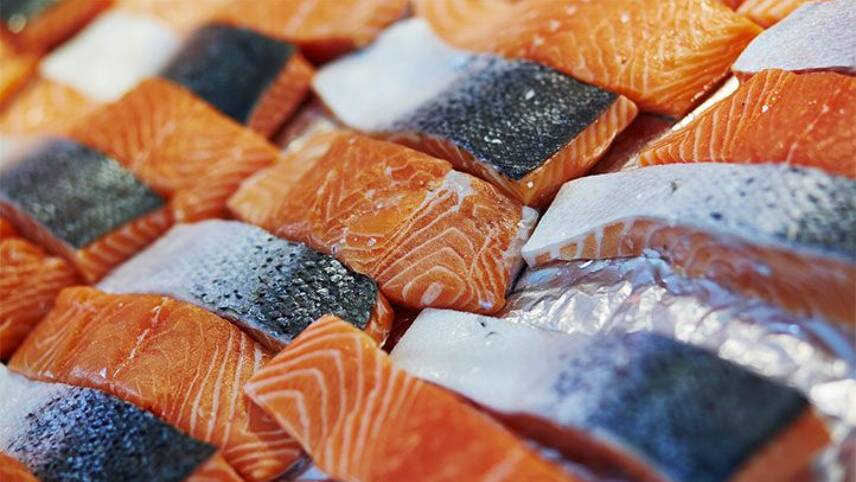Register for free and continue reading
Join our growing army of changemakers and get unlimited access to our premium content

The report raises deep concerns over animal welfare and the sustainability of fish feedstocks
Conducted by the Charging Markets Foundation and Feedback, the ‘Floundering Around’ report assesses 33 of Europe’s largest food retailers on the sustainability policies they have implemented for sourcing farmed fish – as well as how much information they publicly provide on fish and fish food supply chains. Also assessed were the ways in which the retailers communicated sustainability-related information on fish to consumers.
On sourcing, the report deems 76% of the retailers to have a “near-total lack” of “substantive policies” to tackle the most pressing environmental and ethical issues in the supply chain.
Progress was found to be weakest in the field of eliminating wild-caught fish from fish feed, with no retailer providing the NGOs with a time-bound target for elimination plus a credible delivery plan. The report reiterates past research revealing that around one-fifth of the world’s marine fish catch made annually is converted into fish meal and fish oil (FMFO)`, used to feed farmed fish and animals. West African Waters have been reportedly over-exploited for the production of FMFO.
Tesco, which has a roadmap for including alternatives to FMFO in feed, and French retailer Auchan, which is aiming to ensure half of its farmed seafood is fed using less or no FOMO, are highlighted as the only two examples of some leadership in this space. The NGOs would, however, like to see all retailers banning the use of wild-caught fish in FMFO by 2025. FMFO use globally is already decreasing; according to Schroders, it accounted for 27% of global feed production in 2020, down from 89% in 1990.
On transparency and communications, around one-quarter (27%) of the retailers do not include a producer or farm name on their on-pack labels, do not report on any fish welfare indicators and do not publicly provide information on the composition and origin of fish feed.
Additionally, half of the retailers could not prove they are reporting on fish mortality rates. Waitrose is named in the report as a leader in this field and Tesco told the NGOs that it would stop using a supplier if mortalities reached “critical” levels. More broadly, however, progress was deemed weak.
Researchers used company websites and reports, as well as in-store surveys and a detailed engagement questionnaire sent to each brand, to put together the report.
Aside from Tesco and Waitrose and Partners, the UK-based retailers named in the report are Aldi GB, Asda, the Co-Op, Lidl GB, Morrisons, Marks & Spencer (M&S), Sainsbury’s and Iceland. The latter achieved the worst overall ranking, largely because it failed to respond to the researchers’ questionnaire. Asda and Lidl GB rounded out the bottom three for UK retailers. The highest-scoring UK retailer was M&S.
Amid population growth and, specifically, plans to double UK salmon production by 2030, “retailers must push their suppliers to farm better or face serious reputational consequences,” argued the Changing Markets Foundation’s campaigns director Nusa Urbanic.
Urbanic added: “For years, we have documented the devastating impacts fishing for feed has on oceans and on food security of vulnerable communities in the Global South. Supermarkets pay lip service to sustainability in their public statements, but refuse to take meaningful action to eliminate this damaging practice from their supply chains.”
Industry response
edie wrote to every UK-based retailer named in the report for a response to the claims made.
A Sainsbury’s spokesperson said: “Sainsbury’s has a longstanding commitment to sustainable fishing and is the UK’s largest retailer of MSC-certified sustainable seafood. We have also adopted the MSC Standard into our sourcing policies as our benchmark for wild fisheries.
“All of the farmed fish we sell is independently certified to a best practice aquaculture standard and we are in the process of strengthening this by adopting the Aquaculture Stewardship Council (ASC) standard across our farmed fish which covers both social and environmental issues.
“We are participants in the Global Dialogue on Seafood Traceability which has developed consistent digital protocols for recording of fish catches and traceability through the supply chain and we are investigating how these digital systems can be used to deliver very specific information around catch locations in future.”
The MSC itself has notably been criticised by campaigns including On The Hook and Feedback.
An M&S spokesperson said the company has had a sustainable sourcing policy in place for fish and seafood since 2997. They said: “We want our customers to be confident that the food they buy from M&S has been sourced responsibly from healthy, well-managed fisheries and farms and we’re committed to providing a high level of transparency about the sustainability status of the species we sell. We actively encourage all our aquaculture suppliers to reduce the use of marine ingredients in aquafeed and to increase the use of by-product and non-marine ingredient alternatives.”
The British Retail Consortium, which represents every UK-based retailer named in the report, issued a statement from sustainability policy adviser Nadiya Catel-Arutyunova, who wrote: “UK retailers are dedicated to sourcing seafood products responsibly, with the UK having the some of the greatest coverage of independent sustainable seafood certification in the world. Our members regularly review fishing practices in their supply chains to ensure they meet the highest standards.”
Sarah George


Please login or Register to leave a comment.